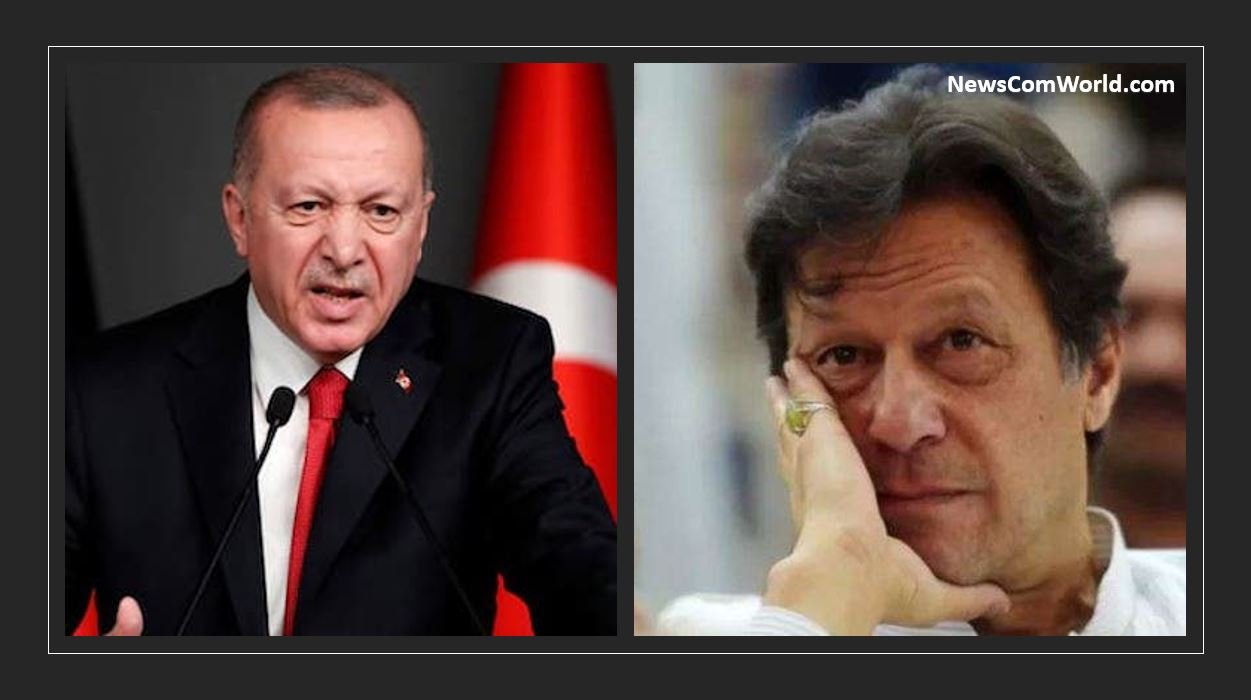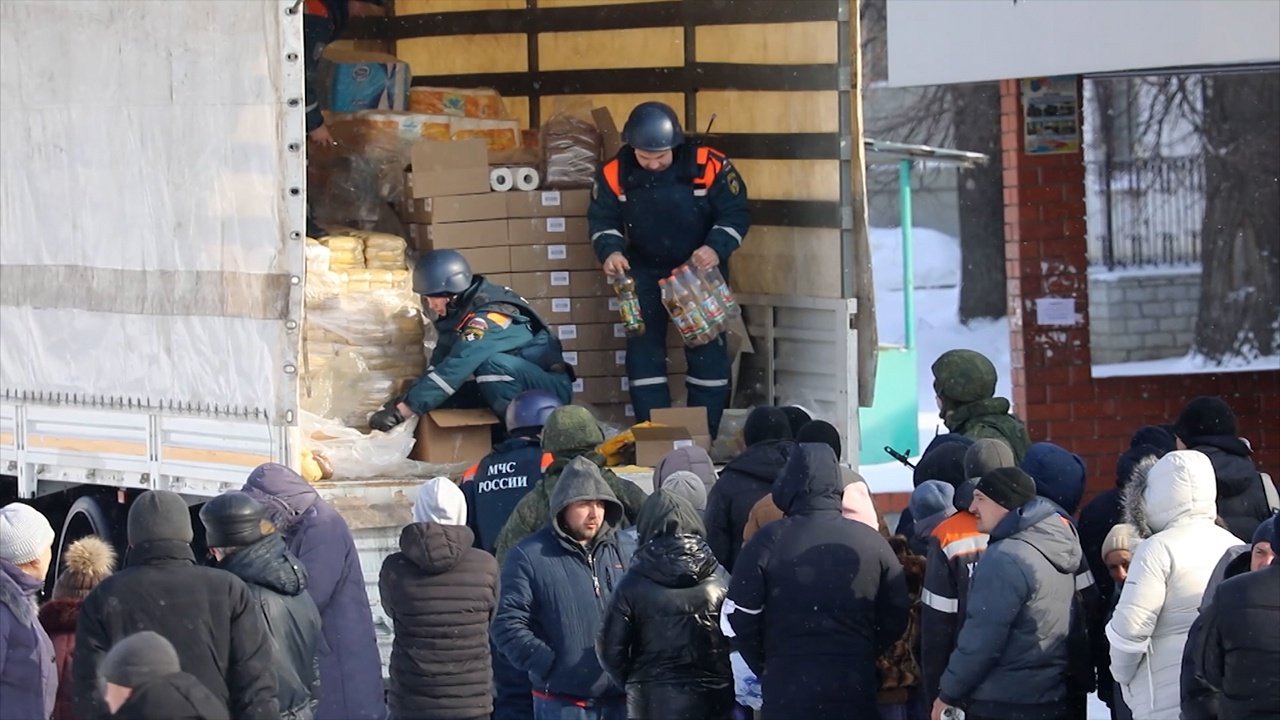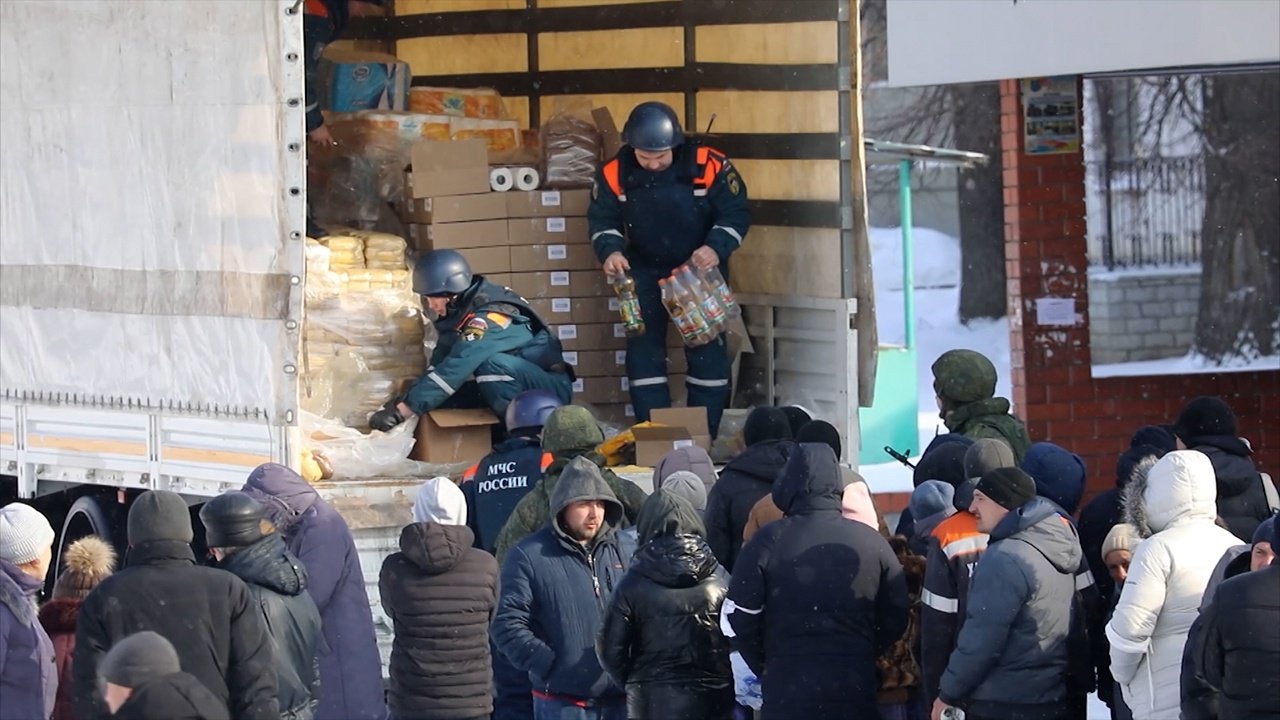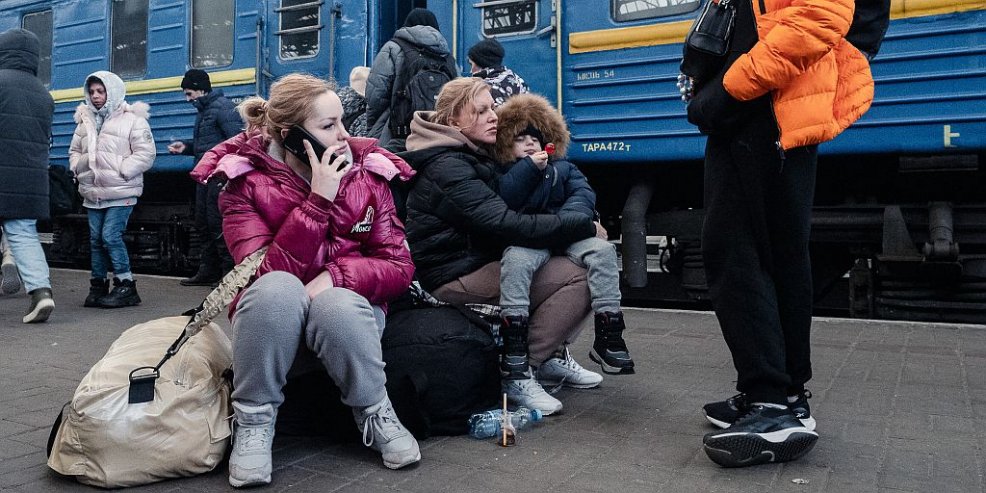Is it a failed attempt by Turkey to become the leader of Muslim Ummah? Erdogan is a part of the problem. Once a darling of the West, he now keeps the company of some of the world’s most unsavory leaders and has come to resemble them.
Why is Turkey becoming an Outcast? – NATO doesn’t want him
U.S. Secretary of State Mike Pompeo on in early September vowed that the United States “will sanction every violation of sanctionable activity.”
It is said that Turkey would also face penalties for violating U.S. sanctions.
U.S. Treasury Secretary Steven Mnuchin said this month that the United States was considering levying sanctions on Turkey for its purchase of Russian S-400 missile defence systems.
A New York Post op-ed on 24-September 2019 described Turkish banks’ 2012-to-2015 oil-for-gold operations with Iran as “the biggest sanctions-evasions scheme in recent history”. The article also highlighted a U.S. lawsuit accusing a Turkish bank of financing the Palestinian group Hamas, which the United States designates as a terrorist organisation, and U.S. Treasury sanctions against 10 Turkey-linked entities on similar charges.
U.S. sanctioned Turkey-based financiers of ISIS
The U.S. Treasury on 10-September 2019 designated 10 Turkey-linked firms and businessmen as affiliated with Islamist militant groups including Islamic State (ISIS) and Hamas, part of a broader announcement of 15 sanctioned entities.
The Treasury’s press release designated companies and individuals in Istanbul, Izmir and Turkey’s southeast that sent tens of millions of dollars to ISIS, Hamas, and Hezbollah, including funds from Iran’s al-Quds Force, and included a gold-for-cash scheme.
These sanctions mean that all U.S.-controlled property linked to those targeted must be blocked and reported to the Treasury’s Office of Foreign Assets Control, and anyone engaging in business with the targeted entities could themselves face sanctions.
9 of the 10 Turkey linked persons and firms in the US list of sanctioned entity are: –
Zaher Jabarin (Jabarin)
Turkey-based Jabarin is the head of HAMAS’s Finance Office. In his capacity as head of HAMAS’s Finance Department, Jabarin was focused on developing a financial network in Turkey that would allow HAMAS to raise, invest, and launder money prior to transferring it to Gaza and the West Bank.
Redin Exchange
As of March 2019, the Turkey-based Redin Exchange and Treasury-designated financial facilitator Muhammad Sarur were involved in a $10 million dollar transfer to HAMAS’s operational arm, the Izz-Al-Din Al-Qassam Brigades.
Saksouk Company for Exchange and Money Transfer (Saksouk)
In late 2018, Saksouk handled fund transfers on behalf of Syria-based ISIS members. a money exchange and transfer service. ISIS’ financial facilitators, including Fawaz al-Rawi, listed Saksouk branches in Syria, Lebanon and Turkey as points of contact, and ISIS’ immigration committee attempted to transfer money via Saksouk, according to the Treasury.
Al-Khalidi Exchange (Al-Khalidi)
As of early 2017, al-Khalidi in al-Raqqah, Syria, and Gaziantep, Turkey were involved in ISIS’s transfer of funds from Iraq through al-Raqqah, Syria, to Gaziantep, Turkey, in support of ISIS. As of 2017, ISIS also transferred money into Syria via al-Khalidi.
Al-Hebo Jewelry Company (al-Hebo)
As of late 2017, al-Hebo’s location in Gaziantep, Turkey was involved in an ISIS scheme to convert gold into cash to more efficiently and secretly send funds via hawalas in Turkey to ISIS sleeper cells in Iraq and Syria.
Muhamad Ali al-Hebo (Muhamad)
As of late 2016, Turkey-based al-Hebo owner, Muhamad, was involved in procuring precious metals to enable ISIS to produce its own ISIS coinage.
Marwan Mahdi Saleh Al-Rawi and Ismael Tash. Marwan al-Rawi is Redin’s CEO, while Tash is Redin’s deputy CEO and in charge of foreign relations. Tash played a key role in many transfers from Iran’s al-Quds to Hamas and has had contact with Muhammad Sarur.
SMART import-export trading firm. Owned by Tash, SMART shares an Istanbul address with Redin Exchange and looks like a possible front company.
Al Haram Foreign Exchange service. In April, ISIS members in Syria were instructed to conduct all financial transactions via Al Haram, which has worked with Fawaz al-Rawi, who is known to make transfers within Turkey.
The Treasury’s announcement came one day after U.S. Treasury Secretary Steven Mnuchin reiterated on 9-September 2019 that the United States was considering sanctions against Turkey for its purchase of a Russian S-400 air defence missile system. Ankara and Washington have been at loggerheads over Turkey’s purchase of the S-400 system, which the United States says is not compatible with NATO defenses and poses a threat to Lockheed Martin’s (LMT.N) F-35 ‘stealth’ fighter jet.

Washington expelled Turkey from the F-35 fighter jet programme in July after the first delivery of S-400s was received. The U.S. Congress has also passed bills requiring the government to impose measures on Turkey under 2017 legislation designed to discourage countries from defence partnerships with Russia.
In addition, the U.S. Treasury has yet to determine whether Turkey’s state-owned Halkbank will be punished for what a U.S. court said were violations of sanctions on Iran.
The United States has appealed to Turkey to curb Hamas-related activity since at least 2015, while Ankara has been accused for years of turning a blind eye to ISIS supporters within its borders.
ISIS – Europe refugee crisis, North Syria, ISIS terrorists from Europe, ISIS petrol smuggling
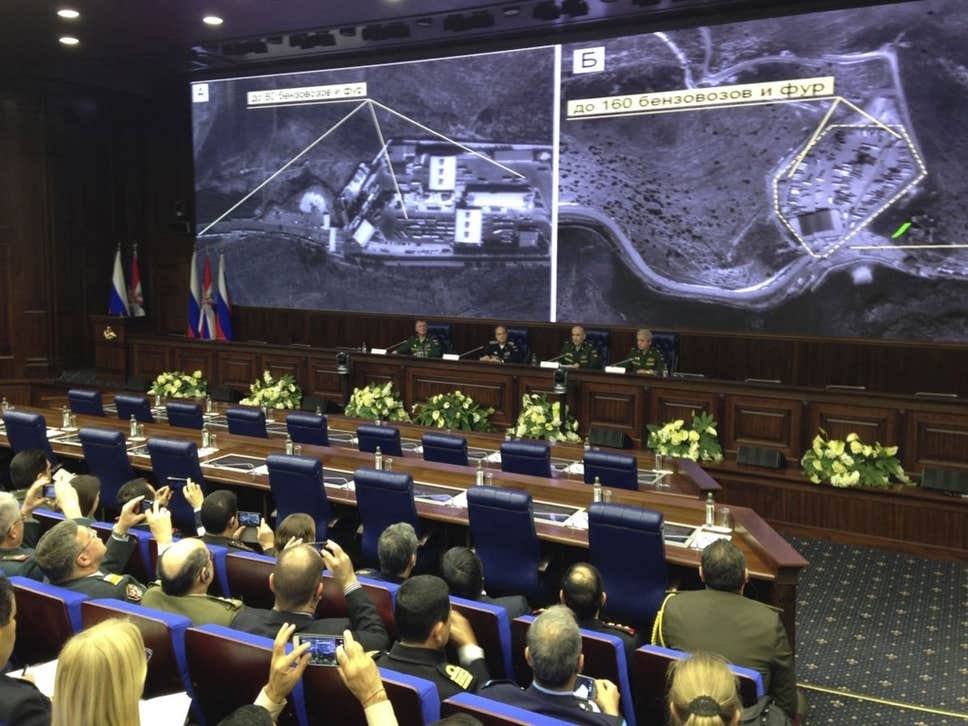
As per a news published by rt.com in 2015 Russia’s Defense Ministry published images and a map it says reveal a chain of oil smuggling to Turkey from Islamic State – from extraction to refining facilities. At least three ISIS oil supply routes were located, all leading to Turkey.
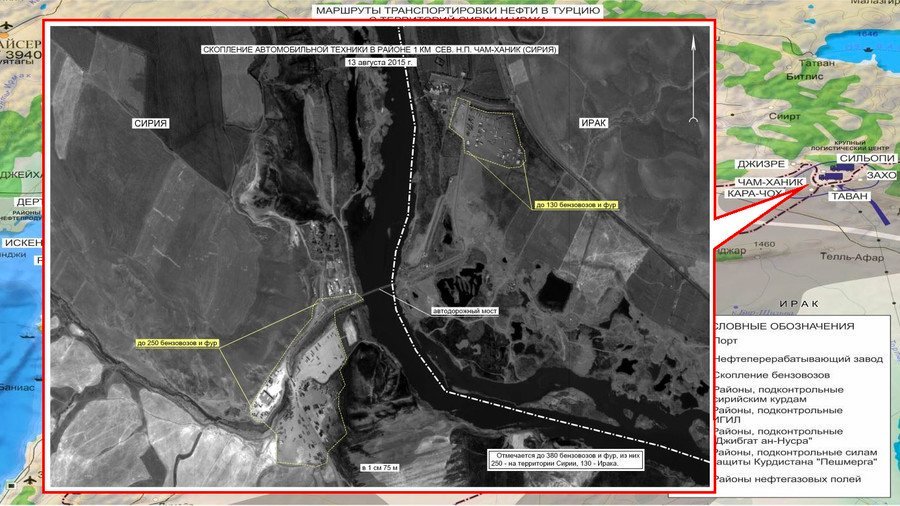
“The General Staff of the Russian Federation Armed Forces has irrefutable evidence of Turkey’s involvement based on aerial and space reconnaissance data,” Lieutenant-General Sergey Rudskoy said during the Defense Ministry briefing.
According to Rudskoy, Russia has identified “three main oil transportation routes from ISIS-controlled Syrian and Iraqi territories into Turkey.”
“The western route leads to the Mediterranean ports, the northern route leads to the Batman oil refinery on the Turkish territory and the eastern one leads to a large transfer base in Cizre [Turkey].”
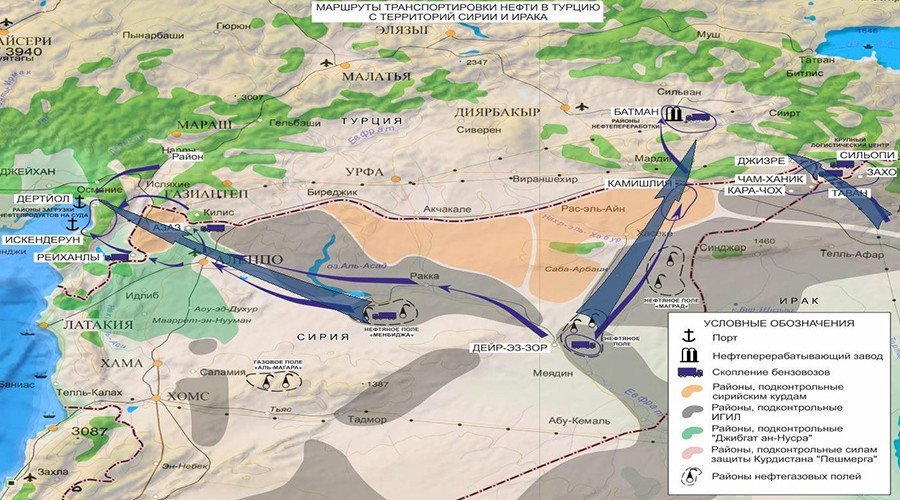
The documents published by the ministry show “the entire chain of oil supply into Turkey – from extraction to refining facilities.”
“In total, in their illegal oil smuggling business, terrorists are using at least 8,500 trucks to transport up to 200,000 barrels of oil every day.”

He added that the vehicles with illegal oil that are crossing Turkey are not checked at the border.
“The presented photos, which were taken this August, demonstrate hundreds of oil trucks and heavy vehicles moving both to and from the Turkish border.”
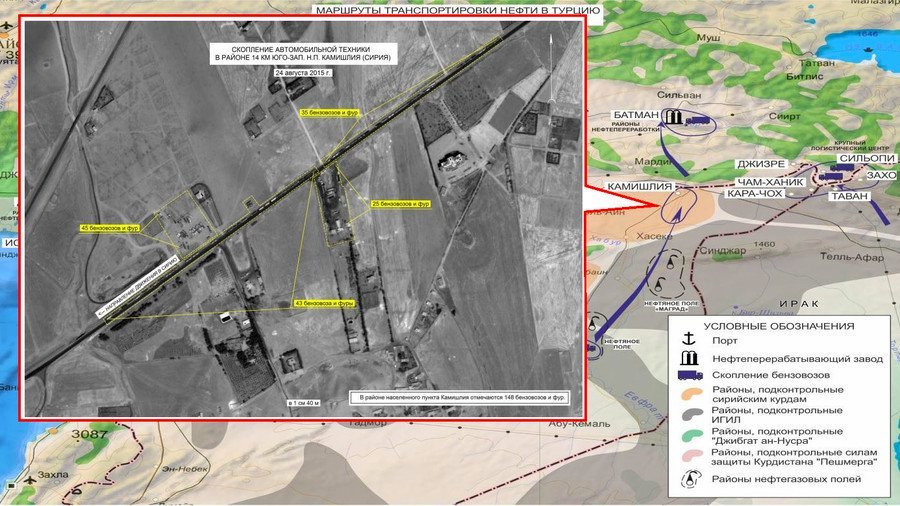
Rudskoy concluded that most of the oil is being transferred from eastern Syria to a large oil refinery plant in Batman, 100km from the Syrian border.
The 200,000 barrels of oil that Russia says is smuggled by IS every day is roughly equivalent to the average daily oil export of Gabon in 2014 or Australia in 2013, according to an OPEC annual statistical bulletin.
“Turkey’s actions are de facto protection of Islamic State,” Medvedev said in November 2015, calling the group formerly known as ISIS by its new name. “This is no surprise, considering the information we have about direct financial interest of some Turkish officials relating to the supply of oil products refined by plants controlled by ISIS.”
“The reckless and criminal actions of the Turkish authorities… have caused a dangerous escalation of relations between Russia and NATO, which cannot be justified by any interest, including protection of state borders,” Medvedev said in November 2015.
However thereafter Turkey purchased Russian Air Missile defense system S-400, signalling improvement of relations with Russia.
Turkey’s Role in Rise of ISIS
It was Turkey’s actions, or perhaps the lack thereof, that helped fuel the rise of the Islamic State in the first place. The two most commonly cited factors leading to the growth of the Islamic State are the Syrian civil war and the government of former Iraqi Prime Minister Nouri al-Maliki and its persecution of Sunni Arabs in Iraq. But another significant part of this story is the active support exhibited by the Turkey to ISIS which Turkey has always denied publicly.
Beginning in late 2013 and early 2014, Turkish border cities became the chief logistical hubs for foreign fighters seeking to enter Syria and Iraq to join the Islamic State and other rebel groups. By all accounts, foreign fighters from around the globe first traveled to Turkey and then on to Iraq and Syria, forming the backbone and striking power of the Islamic State. In 2013 alone, some 30,000 militants traversed Turkish soil, establishing the so-called jihadi highway, as the country became a conduit for fighters seeking to join the Islamic State. By August 2015, Turkey did eventually tighten up its borders and agree to engage in strike missions as part of Operation Inherent Resolve, but by then, the lion’s share of foreign fighters had already arrived in Iraq and Syria.
There are many more examples of Turkey’s active support to Islamic State fighters, including wounded Islamic State militants treated for free at hospitals across south-eastern Turkey. Among those receiving care was one of the top deputies of Islamic State chieftain Abu Bakr al-Baghdadi, Ahmet el-H, who was treated in a private hospital in Sanliurfa in August 2014.
There were also widespread reports of Turkish officials, including Turkish President Recep Tayyip Erdogan’s son-in-law, were involved in the purchase of Islamic State oil through front companies — actions that undoubtedly helped fill the insurgents’ coffers and directly contribute to the group’s longevity. Nevertheless, contraband Islamic State oil was consistently sold at points along the Turkish border throughout 2014 and into 2015. Fast forward to early 2018, and there are reports that Erdogan has signaled consent for Turkish forces to enlist the help of former Islamic State fighters in Ankara’s ongoing battle against the Kurds. And according to Conflict Armament Research, an organization partly funded by the European Union that identifies and tracks conventional weapons and ammunition in contemporary armed conflicts, Turkey “is the most important choke point” for components used in the manufacture of improvised explosive devices by the Islamic State.
The United States works with the Kurds in Syria because they are the most effective fighting force on the ground, and really the only nonstate actor willing to and capable of fighting the Islamic State. In contrast, the Turkish government has been duplicitous in its objectives, nominally supporting the anti-Islamic State coalition while simultaneously engaging in actions that undermine the same coalition.
Like every nation, Turkey has the right to defend its own borders. But Olive Branch was a preemptive strike against the Syrian Kurds for Turkey’s own purposes — it is no secret that Ankara has long harbored ill will against Syrian Democratic Union Party (PYD), Kurds based on their links to the Kurdistan Workers’ Party (PKK), a banned Turkish terrorist group, and their admiration for jailed PKK leader Abdullah Ocalan.
The Olive Branch operation is not only about protecting Turkey from terrorism. There’s good reason to think it’s also an offensive campaign designed to increase Turkey’s leverage in future political negotiations in Syria, where it is working with Iran and Russia to minimize American involvement. Turkey continues to seize control of Syrian territory, administering it and installing its own governing structures.
Flanked by Iranian President Hassan Rouhani and Russian President Vladimir Putin, Erdogan appeared at a recent press conference to suggest that Turkey, Iran, and Russia are working toward stabilizing Syria, even as Tehran and Moscow enable Syrian leader Bashar al-Assad, who in April first week once again used chemical weapons on his own people in Douma.
It is exactly Turkey’s continued incursions into Syria and failed attempt by Turkey to portray it as the savior of all Sunnis and leader of Muslim Ummah, which is reinforcing ethnic divisions by pitting Sunni Arabs against PYD Kurds.
While Turkey may seek to bring an end to the Syrian civil war to resolve a long-simmering conflict on its border, it is also evidently concerned with denying operating space to the PYD, seeking to ensure that Kurdish dreams of autonomy within Syria are dashed. But Erdogan’s militancy comes with a price. Already, there is evidence that Turkey has squandered its soft power in the region, as diplomacy and cultural initiatives have been supplanted by military force and belligerence directed at its neighbors.
But if Turkey’s goal is truly to finish off the Islamic State, then targeting the People’s Protection Units (YPG) is having exactly the opposite effect. With the YPG focused on defending itself from Turkish advances, it is distracted from the ongoing battle to eradicate the last remaining pockets of Islamic State militants from Syria.
Washington would be wise to reconsider a hasty withdrawal from Syria, since any premature departure of American troops would almost certainly ensure that the United States has reduced leverage in future negotiations over the end of the conflict in Syria. And it would likely guarantee that the Islamic State would rise again, despite recent claims by Cavusoglu and Turkey that the Islamic State has “largely been militarily defeated.”
Military Coup
Erdogan is surely a part of the problem. Once a darling of the West, he now keeps the company of some of the world’s most unsavory leaders and has come to resemble them. Institutions are weakening. Liberties are declining. Democracy is eroding. Relations with Russia are cozier than ever, while ties with the United States are at their nadir and those with Europe remain crisis-ridden.
Turkish officials say that the July coup attempt materialized because Gulenists were increasingly concerned that the government investigation into their illegal actions was coming to an end, and they would be arrested.
Gulen, on the other hand, denies any role in the coup and has even alleged that Erdogan orchestrated it himself “to build a dictatorship“
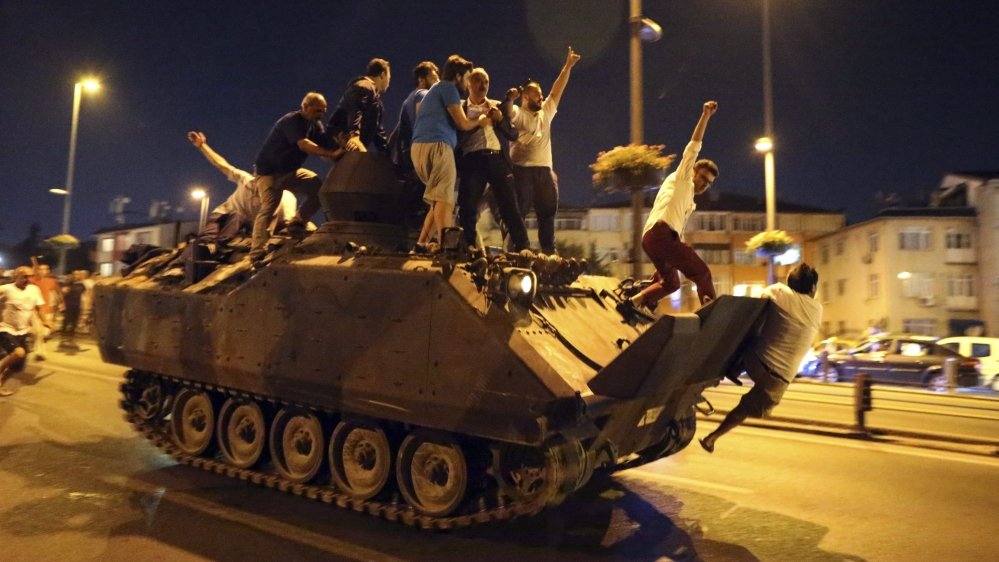
Intelligence officials said that in the months before the failed coup attempt, the country’s spy agency decoded millions of secret messages sent by suspected Gulenists, but found no mention of the plot.
It is still not entirely clear how the MIT failed to detect the preparations for the coup attempt and why it failed to notify the president or the prime minister immediately once they received intelligence on the plot.
Only days after the coup attempt, on July 22, the Turkish government declared a state of emergency “to be able to remove swiftly all the elements of the terrorist organisation involved in the coup attempt”.
Thousands of military officials, pilots, police officers, civil servants, academics and even teachers were sacked from their jobs for alleged links to the “terrorist” preacher and his movement.
Dozens of media outlets suspected of having links to the Hizmet movement were also shut down.
As of today, more than 100,000 people have been sacked or suspended and 50,000 arrested in an unprecedented crackdown. The government has deemed the crackdown necessary to “root out all coup supporters from the state apparatus”.
Turkey’s media crackdown since the failed coup — pointing to 180 news outlets shuttered, 200,000 websites blocked, and at least 100 journalists in prison.
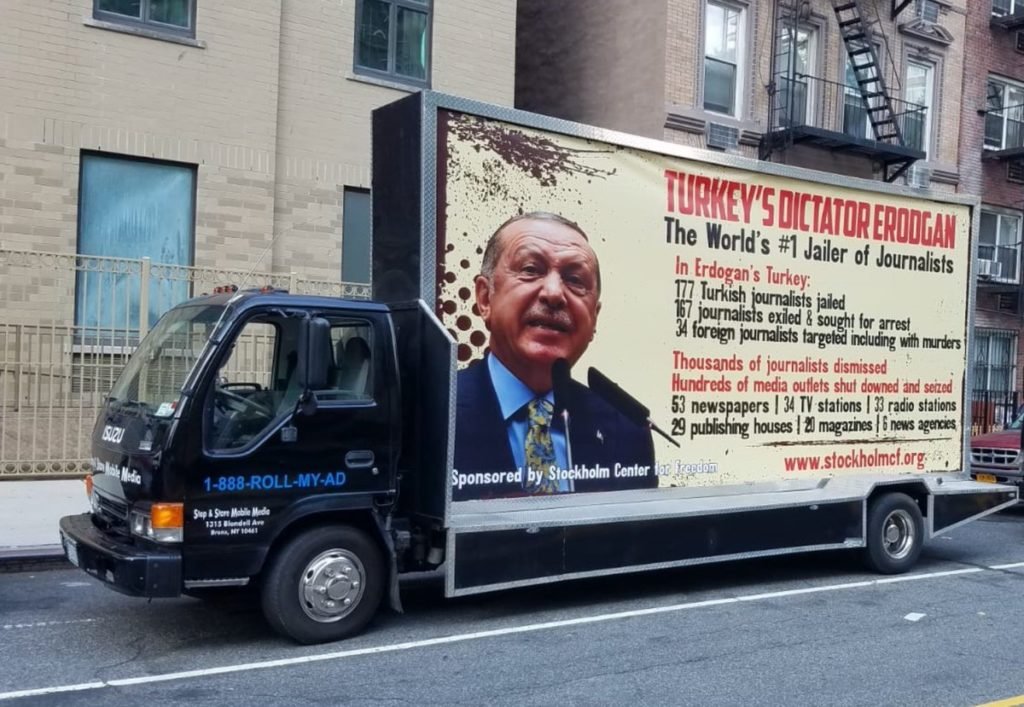
In another move, the ability of universities to elect their own rectors was also abolished. Erdogan will now directly appoint nominees.
The post-coup purge led to a rift in Turkey’s relations with the European Union, which accused Erdogan of using the coup attempt as an excuse to eliminate the opposition.
Turkey’s relations with the US also deteriorated as a result of this incident, as Washington refused to extradite Gulen.
The Turkish Justice Ministry formally demanded in September that US authorities arrest Gulen on charges of “ordering and commanding the attempted coup”. But to this day, US authorities insist that they do not have enough evidence to arrest Gulen or to start the formal process for his extradition.
The only group that was not included in the newly found spirit of solidarity was Turkey’s Kurds. The leader of the pro-Kurdish Peoples’ Democratic Party, Selahattin Demirtas, was excluded from the post-coup talks on the grounds that his party allegedly supports the outlawed Kurdistan Workers’ Party (PKK).
Later, the government used the state of emergency to shut down several pro-Kurdish media organisations and arrest Kurdish journalists and civil servants for their alleged links to the PKK.
In March 2017, Germany’s intelligence chief said Germany was unconvinced by Erdoğan’s claim that Fethullah Gulen was behind the failed coup. Also in March, the British Parliament’s Foreign Affairs Committee said some Gulenists were involved in the coup d’état attempt but found no hard evidence that Fethullah Gülen masterminded the failed coup and found no evidence to justify the UK designating the Gülen movement as a “terrorist organization”.
NZ Terror attack video in rallies
Turkish President Recep Tayyip Erdogan showed excerpts of a video taken by the attacker who killed 50 people in mosques in New Zealand, to denounce what he called rising hatred and prejudice against Islam.
Speaking at a campaign rally in the northern town of Eregli, Erdogan also criticized New Zealand and Australia for sending troops to Turkey in the Gallipoli campaign during the First World War, claiming their motive was anti-Islam-oriented. He called on New Zealand to amend its laws to ensure the attacker is severely punished.
“What business did you have here? We had no issues with you, why did you come all the way over here?” Erdogan said. “The only reason: We’re Muslim, and they’re Christian.”
During some rallies President Erdoğan repeatedly showed video taken by the Christchurch mosque shooter to his supporters at campaign rallies for upcoming elections and said Australians and New Zealanders who came to Turkey with anti-Muslim sentiments “would be sent back in coffins like their grandfathers were” during the Gallipoli Campaign of World War I.
The comments drew a strong protest from Australian Prime Minister Scott Morrison condemned the “reckless” and “highly offensive” comments made by Erdoğan.
Australian Prime Minister Scott Morrison, who called in Turkey’s ambassador and demanded they be withdrawn. His government issued a travel advisory warning people visiting Canakkale for the anniversary to exercise caution.
Hundreds of New Zealanders and Australians travel to Canakkale each year for Anzac Day on April 25, to mark the start of the battle of Gallipoli and commemorate the dead.
“Remarks have been made by the Turkish President Erdogan that I consider highly offensive to Australians and highly reckless in this very sensitive environment,” Morrison told reporters in Canberra, Australia’s capital.
Turkish leader Erdogan used clips of the Christchurch attack extensively to denounce Islamophobia during campaign rallies. He tried to stoke nationalist and religious sentiments ahead of March 31 local elections.It was a failed attempt by Turkey to project Erdogan as leader of Muslim world. But it got him popularity among his voter base which is essentially uneducated people.
Turkey’s main opposition party has also criticized Erdogan for showing the clip “for the sake of [winning] three or five votes” in the elections. In Turkey, NATO is an object of aversion for Erdogan’s friends and foes alike. The United States is as popular as root canals. Only 18 percent of Turks have a favorable view of the country. Seventy-two percent consider it a major threat.
Turkey in pursuit of Nuclear weapons
Turkish President Tayyip Erdogan said on 4-September 2019, that it was unacceptable that Turkey was barred from having nuclear weapons while other nations in the region had them.
Erdogan said, “Some countries have missiles with nuclear warheads, not one or two. But (they tell us) we can’t have them. This, I cannot accept.”
“There is no developed nation in the world that doesn’t have them,” Erdogan said
Under international treaties only the US, Russia, the UK, France and China could have nuclear weapons. India, Pakistan and North Korea later developed them too. South Africa had several atomic bombs but dismantled them when it became a democracy.
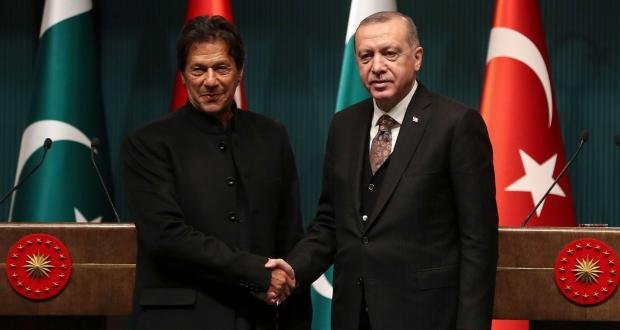
Erdogan stopped short of saying that Turkey would begin developing weapons but seemed to rail against the terms of the Nuclear Nonproliferation Treaty, which Turkey signed in 1980. Turkey has also signed the 1996 Comprehensive Nuclear-Test-Ban Treaty, which bans all nuclear detonations for any purpose.
Maybe this can explain Erdogan’s sudden love for Pakistan and an attempt to shield all of Pakistan’s evils. Pakistan is already a Bankrupt failed nation and isolated by the whole world for running its Terrorist Factories and committing Genocide in occupied Balochistan, Khyber Pakhtunkhwa and Sindh. We covered about Khyber Pakhtunkhwa in our recent article Is Martial Law Imposed By Fascist Pakistan In Khyber Pakhtunkhwa?
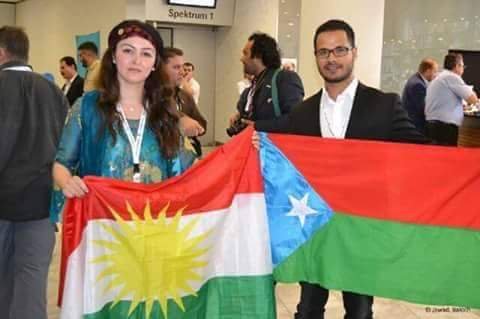
A few million dollars, a few junk old retired fighter jets and a few words of support on Kashmir to isolated Pakistan will make Pakistan transfer all its Nuclear Technology clandestinely to Turkey as it has proliferated to North Korea.
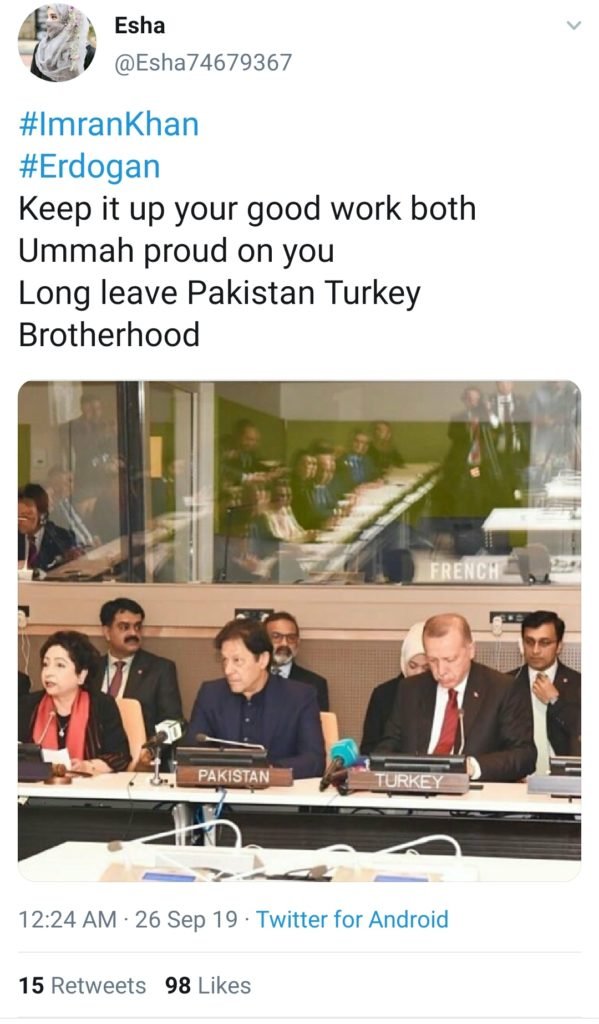
Failed attempt by Turkey to project itself Leader of the Islamic world is working only in Pakistan. People in FATF Grey Listed and Bankrupt Pakistan are considering Turkey as leader of Muslim Ummah which is their only salvation in the present economic turmoil and International isolation.
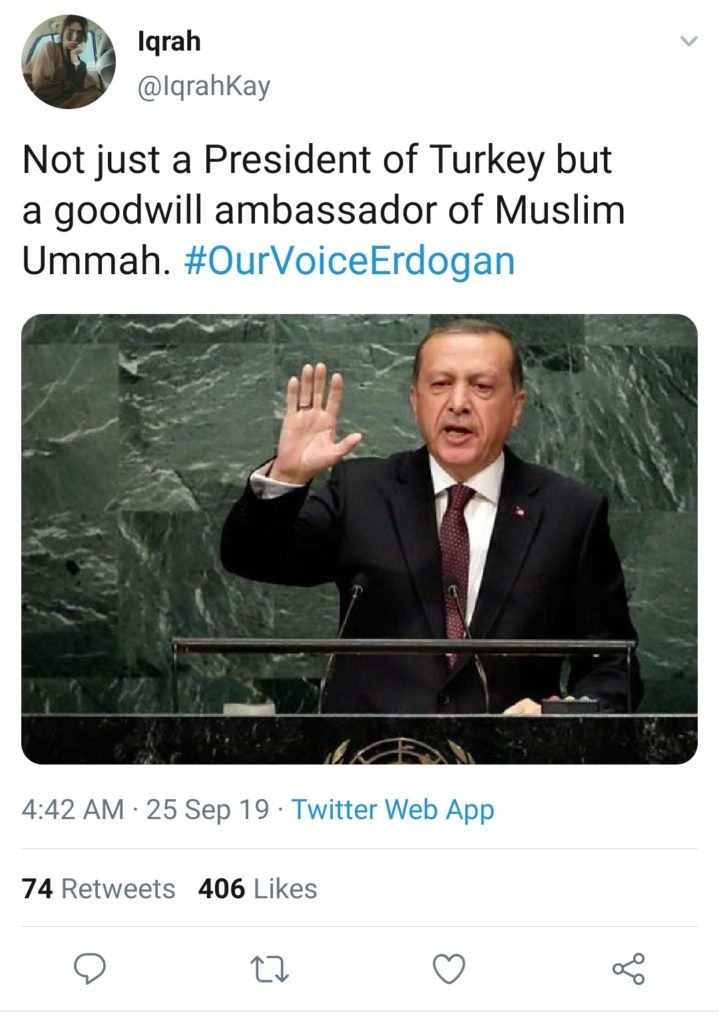
We already covered in details about Pakistan economy bankruptcy in our previous article Naya Pakistan: A Vision OR A Delusion
Turkey Rhetoric against Israel – Aspirations to be the head of Islam and Turkic nations
Speaker at pro-Palestinian conference says “Israel must be dissolved and destroyed”
Now Turkey is stepping up its antisemitic rhetoric against Israel. Beyond calling for BDS (boycotts, divestment, sanctions), its leaders are allying with Iran in the Islamic Republic’s call for the destruction of the Jewish state.
Turkey’s President Recep Tayyip Erdogan also stated in July 2019 that “whoever is on the side of Israel, let everyone know that we are against them.” Erdogan accused Israel of state “terror” against Palestinians, and he is now also pushing for Turkey to have have nuclear weapons “like Israel.”
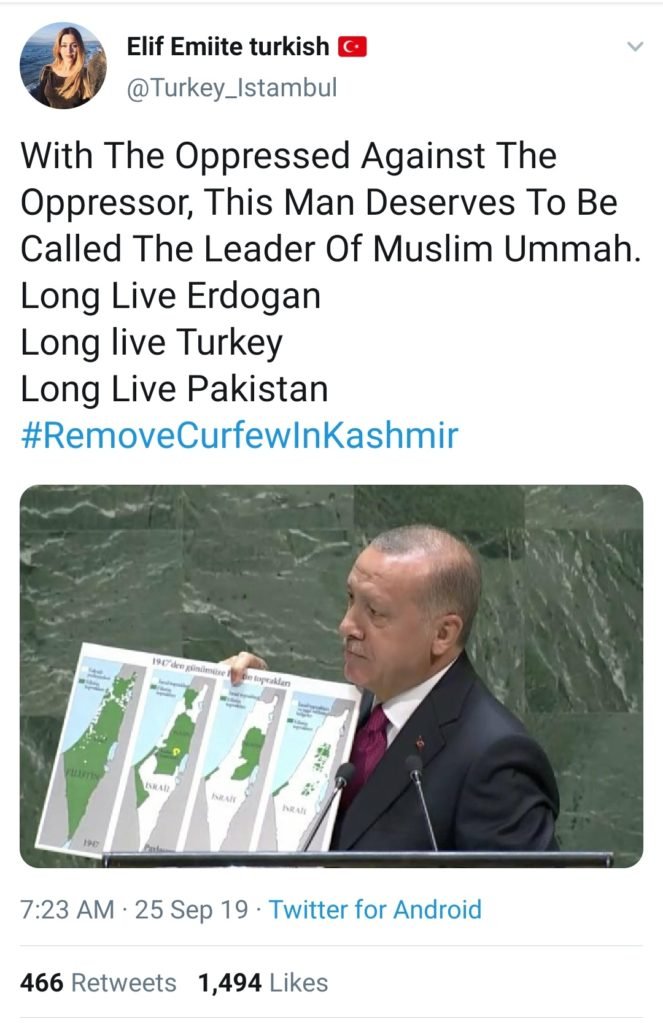
Ankara hosted a pro-Palestinian conference last week in a failed attempt by Turkey to unite the whole Islamic world under Turkey’s leadership, that featured radical Islamists who urged the obliteration of the Jewish state and advocated the Boycott, Divestment, Sanctions campaign targeting Israel.
“Israel must be dissolved and destroyed,” said one speaker, according to a report in the German daily Die Welt.
Speakers also urged boycotts, divestments and sanctions (BDS) against Israel at the event titled “Congress on the Future of Islamic World and Palestine.”
Kadir Arakas, the chairman of a Turkish-Shi’ite association, said “resistance in Palestine is important” during the “weakest period of Israel’s history.” Arakas urged that no Islamic country reach agreements with Israel or work toward closer relations with the Jewish state.
Turkey Isolated in Middle East
President Recep Tayyip Erdoğan of Turkey’s failed attempt to pivot away from Mustafa Kemal Atatürk’s West-centric model in an effort to build regional influence has left Turkey more isolated than ever in the Middle East.
“Today, Ankara is nearly isolated in the Middle East. With the exception of Qatar, Turkey has no friends or allies in the region.”
Turkish ties with the Gulf monarchies, especially Saudi Arabia and the UAE, have suffered because of Erdoğan’s support for the Muslim Brotherhood, which they view as a domestic security threat.
The Turkish-Qatari alliance, meanwhile, has solidified, as both support the Muslim Brotherhood in Egypt, Hamas in Gaza and Brotherhood-linked groups in Syria and Libya. Ankara has provided a lifeline to Doha since its Gulf neighbours placed a blockade in June 2017.
A bloc led by Saudi Arabia is now engaged in a regional battle for influence with the Turkey-Qatar axis. This competition now extends to East Africa, where the Turkey-Qatar axis is vying for influence against the Saudi led bloc along the Nile Valley and around the Horn of Africa in a new Great Game. Turkey is making efforts to build influence in Somalia and Sudan but as the International community is aware, it will be a failed attempt by Turkey.
Recession in Turkey
The Turkish economy contracted 3 percent in the fourth quarter of last year after a currency crisis devalued the lira by nearly 30 percent against the dollar. It drove inflation to a 15-year high, severely limited companies’ ability to service foreign debt and multiplied bad loans in the banking sector.
The central bank hiked its policy rate to 24 percent in September and has left it unchanged since. According to CBRT figures, interest rates for commercial loans in TRY increased from 18 percent to 27 percent between January–December 2018, while those for average consumer loans (including personal, vehicle, and housing loans) increased from 18.55 percent to 31.74 percent.
Official reserve assets of CBRT fell by 13.6 percent to $93 billion, driven by the fall in foreign currency reserves from 82.6 billion to 71.3 billion (partly due to the CBRT decision to lower banks’ foreign exchange reserve requirements to provide liquidity) while gold reserves also fell from 23.5 billion to 20.1 billion.
According to TUIK statistics, unemployment spiked close to a nine-year high at 13.5 percent year-on-year in December 2018, surpassing the government estimate of annual unemployment of 11.3 percent in the NEP. The number of unemployed increased by 1 million to 4.3 million compared to December 2017 while youth unemployment increased by 5.3 percentage points to 24.5 percent.
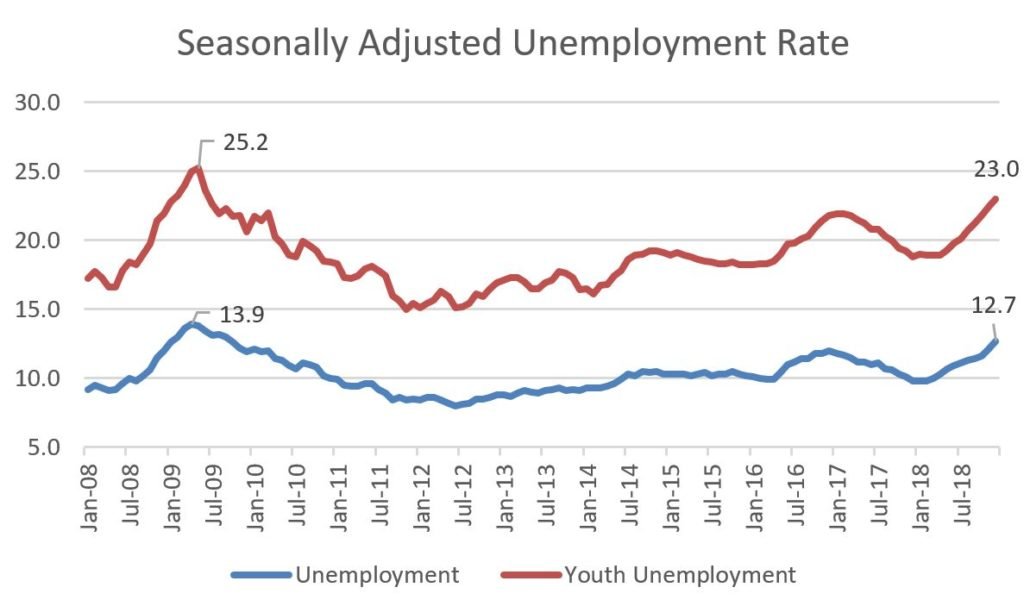
Support for Turkey’s ruling Justice and Development Party (AKP) is higher among people with lower education levels.
The results of the presidential election in 2018 and of local elections this year prove this.
According to survey results shared by pollster Ipsos, in the 2018 presidential elections, Recep Tayyip Erdoğan, the joint candidate of the AKP and its ultranationalist ally, the Nationalist Movement Party (MHP), received 60 percent of the votes of those with primary and lower school education. Fifty-two percent of middle and high school graduates voted for Erdoğan while he received 32 percent of the vote share of persons with higher education.
A similar result was seen in the local elections on March 31. The AKP-led People’s Alliance, made up of the AKP and MHP, received more votes than all other parties combined from persons with educational backgrounds other than higher education.
The model was simple and functional. Employment in the construction and service sectors, which did not require companies to compete internationally, could be achieved at a lower investment cost compared with job creation for the production and export of value-added goods. At the same time, as the average wage in these sectors was relatively low, economic slowdown caused less unemployment. Consequently, unskilled workers managed to stay employed for many years and became a stable voter base of the AKP.
However, recent negative developments in the economy, sparked by last year’s currency crisis and a consequent economic recession, have undercut the policies implemented by the AKP over the past 15 years. The source of cheap foreign currency lending has dried up as the lira tumbled. And the livelihoods of these lower educated people and their employment prospects have come under threat as a surge in interest rates and a weaker lira pummeled spending power.
The jobless rate for non-university graduates who benefited from social education-aid programs with employment guarantees almost doubled this year compared to the same period of 2018 and reached 8 percent.
The rapid increase in unemployment among unqualified workers is important because it shows that even the most protected segment of society has been affected by the recent economic turmoil.
According to the Turkish Statistical Institute (TürkStat), 735,000 of 957,000 people who lost their jobs over the past year were working in the service, construction and agriculture sectors where low-educated people are mostly employed. The number of people working in the manufacturing industry decreased by only 222,000. Why is he doing it
Turkey on Uyghurs Muslims in China
In February 2019, after many democratic countries raised concerns about China’s cultural genocide against Muslims for years, Turkish Foreign Ministry spokesman and President Recep Tayyip Erdogan condemns the systematic assimilation, arbitrary arrests, cruel torture, political brainwashing in internment camps and prisons of more than one million Uyghurs and other Muslim communities by China and called on to end the human tragedy.
However the financial turmoil in Turkey’s economy made Erdogan to change his statements too quickly. Surprisingly in July 2019 in a major shift, Turkey – which bills itself as a leader of the Islamic world – is the latest country to retreat into silence. He gave his implicit support to China’s policies in Xinjiang during a state visit to China.
“It is a fact that the people of all ethnicities in Xinjiang are leading a happy life amid China’s development and prosperity,” Erdogan said on 2-July 2019.
Taking a Sharp U turn on his previous ranting against China, Erdogan said, some people were seeking to “abuse” the Xinjiang crisis to jeopardize Turkey and China’s economic relationship. This abuse is having a negative impact on Turkish-Chinese relations. It is necessary that we do not give opportunity to such abuse.”
Follow us at:-
Twitter Handle: @newscomworld
Instagram Handle: @newscomworld
Parler Handle: @newscommuniquecom
Subscribe our : YouTube Channel https://www.youtube.com/channel/UCnKJQ3gFsRVWpvdjnntQoAA
Like our Facebook Page https://m.facebook.com/News-Communiquecom-103788531007438/
1,724 total views



